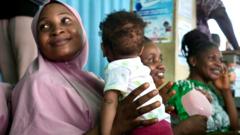Nigeria, the nation with the highest malaria death toll globally, has marked a significant step in public health by rolling out the R21/Matrix-M malaria vaccine for the first time. The vaccine's introduction comes as the country grapples with the highest number of malaria-related deaths, accounting for almost a third of the total fatalities worldwide. In response to this dire situation, health officials have emphasized the importance of using the vaccine alongside existing prevention measures, such as insecticide-treated mosquito nets.
The immunization campaign commenced in Bayelsa and Kebbi, two of the hardest-hit regions. Health authorities have articulated plans to extend the program nationwide within the next year. Parent Happiness Idia-Wilson, whose 11-month-old son was among the first recipients of the vaccine, underscored the importance of vaccination for child safety, urging other mothers to participate in the program.
According to the World Health Organization (WHO), Nigeria contributed to 27% of global malaria cases and 31% of associated deaths in 2022. Children under five and pregnant women are considered particularly vulnerable populations. Dr. Walter Mulombo, WHO representative in Nigeria, expressed optimism that the vaccine, combined with pre-existing preventive strategies, could significantly diminish the malaria burden in the nation, aiming toward a malaria-free Africa.
The vaccine, developed by the Jenner Institute at Oxford University, involves administering three doses within a four-week interval, followed by a booster after one year. Earlier in 2023, other African nations like Ivory Coast and the Democratic Republic of Congo commenced similar vaccination efforts with R21/Matrix-M. Despite Nigeria's exclusion from earlier rollouts of the RTS,S vaccine trial in Ghana, Kenya, and Malawi, its new campaign marks a crucial development in its fight against malaria, a disease costing the economy an estimated $1.1 billion annually due to lost productivity and health-related expenses.

















